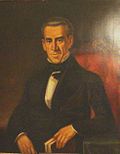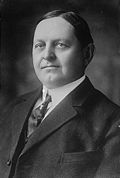Inductees
| Name | Image | Birth–Death | Year | Area of achievement |
|---|---|---|---|---|
| Clement Comer Clay |  | (1789–1866) | 1953 | Statesman |
| Samuel Dale |  | (1772–1841) | 1953 | Pioneer frontiersman |
| William Crawford Gorgas |  | (1854–1920) | 1953 | Surgeon General of the United States Army |
| John Tyler Morgan |  | (1824–1927) | 1953 | United States Senator |
| Daniel Pratt |  | (1799–1873) | 1953 | Industrialist |
| Raphael Semmes |  | (1809–1877) | 1953 | Naval commander, captain of the CSS Alabama |
| James Marion Sims |  | (1813–1883) | 1953 | Pioneering gynecologist |
| Eugene Allen Smith |  | (1841–1927) | 1953 | Geologist |
| Julia Strudwick Tutwiler |  | (1841–1916) | 1953 | Educator, reformer |
| Joseph Wheeler |  | (1836–1906) | 1953 | Military commander, politician |
| Robert Lee Bullard |  | (1861–1947) | 1954 | World War I military commander |
| George Washington Stone |  | (1811–1894) | 1954 | Judge |
| John Allan Wyeth |  | (1845–1922) | 1954 | Physician, educator |
| Braxton Bragg Comer |  | (1848–1927) | 1955 | Industrialist, statesman |
| John Pelham |  | (1838–1863) | 1955 | Soldier |
| Booker Taliaferro Washington |  | (1856–1915) | 1955 | Educator, author |
| Charles Allen Cary | (1861–1935) | 1957 | Pioneer veterinarian | |
| Walter L. Fleming | (1874–1932) | 1957 | Educator, historian | |
| Oscar Wilder Underwood |  | (1862–1929) | 1957 | United States congressman |
| Evan Frank Allison | (1865–1937) | 1961 | Conservationist | |
| Augusta Jane Evans Wilson |  | (1835–1909) | 1961 | Author |
| Jerome Cochrane |  | (1831–1896) | 1961 | Public health officer |
| William Luther Sibert |  | (1860–1935) | 1961 | Engineer, soldier |
| Peter Bryce |  | (1834–1892) | 1965 | Pioneer psychiatrist |
| Seale Harris |  | (1870–1957) | 1965 | Physician, medical journal editor |
| Charles A. Boswell | (1916–1995) | 1972 | World War II hero, blind golf champion |